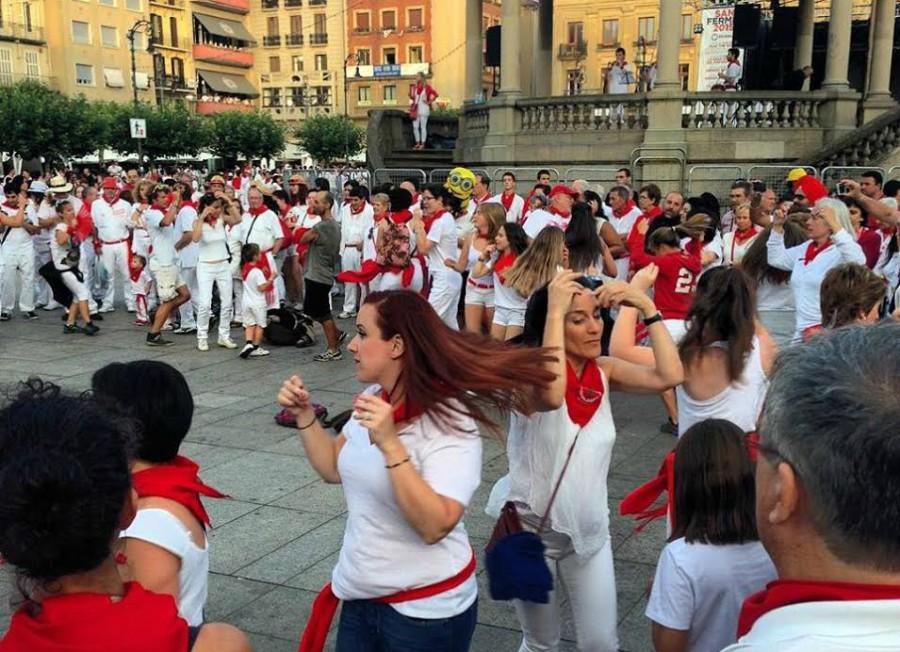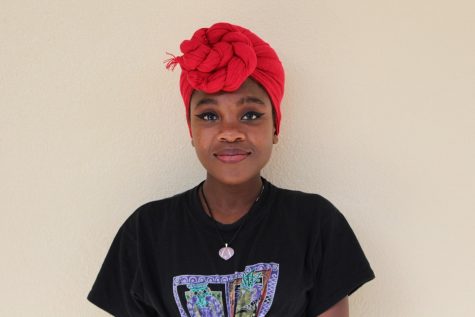“Basque”-ing in the Basque spirit
English teacher Arantxa Arriada dances at the festival of San Fermin in Pamplona, Spain. Photo courtesy Arantxa Arriada
Among the unique range of characters that make up the school’s diverse population, most have probably caught a glimpse of English teacher Arantxa Arriada, the fiery redhead scurrying across campus with her retro dresses, matte-red lips and radiating spirit. It is clear that Arriada shines with a bubbly presence, but the roots of her personality stem from a relatively unknown place: the Basque region.
“Arantxa: she’s a teacher, she’s Basque and she’s loud,” Arriada said. “Those are the big things that define me.”
The Basque region is nestled between northwest Spain and southwest France. The area is deeply rooted in the continent. Anthropologists believe the Basque region was one of the oldest-founded countries in Europe; however, it is now an autonomous community.
Those who do not know much about Basque culture or people often miscategorize Arriada as Spanish.
“Oftentimes, if I’m just meeting someone or if I know I’m not going to interact with them, I’ll just say, ‘Oh, I’m Spanish,’ because it’s easier,” Arriada said. “But Basque culture is really different.”
One unique feature of Basque culture, which many associate as a Spanish tradition, is the Running of the Bulls. Each summer, thousands of people from around the world gather in the city of Pamplona to watch bulls run as part of the eight-day festival of San Fermin. The Running was originally to herd bulls from the country to the city. Over the years, it has evolved into a symbolic part of the festival, which celebrates the patron of Pamplona, Saint Fermin.
Arriada has attended the festival many times, including this summer. She credits this popular event to have put Basque on the map.
“Pamplona is about an hour away from my little town, and so every time I go to Spain, [I] always go to the festival,” Arriada said. “I love it because when I tell people I’m Basque, most people haven’t heard of it. They have no idea what it is… so it’s kind of cool [to have] something that people understand.”
Arriada’s great appreciation and understanding of her culture was taught to her by her family. Her father was born in Basque during the Spanish Civil War. As he was growing up in the ‘60s, Arriada’s father experienced extreme poverty during the aftermath of the war. This led him to be one of the first in his family to emigrate to the U.S. on a shepherd contract.
“It was a really lonely life,” Arriada said. “My dad would literally have 2000 sheep that he was in charge of [in America], and he’d be up in the mountains with the sheep… all over California and parts of Nevada.”
Once he had completed his contract and earned his green card, Arriada’s father was unsure of his next step in life. He faced major adjustment to a new culture and language in America, but staying would offer him more job opportunities. He later chose to return to Spain where he met Arriada’s mother, and together they finally decided to start their lives in America.
The couple moved to San Francisco and raised Arriada in the city. Arriada remains very close to her Basque culture. Arriada’s friends even coined a term for her zest of Basque spirit: “Über Basque.”
“When people think of Spain, they think of like flamenco dancing and paella and bullfighting, which is kind of Basque, but that’s not Basque,” Arriada said. “Our language is completely different; it’s not romance-based, so it sounds nothing like Spanish and it sounds nothing like French… Really, the biggest difference is the language, and I think a language is a lot of what makes a culture.”
Though she did not grow up in the Basque region, Arriada spent her childhood near the San Francisco Basque Cultural Center, where she was able to learn about her heritage with children like herself and experience American culture at the same time.
“There are a lot of differences,” Arriada said. “I would say that the most significant difference is that in the Basque country people live more in the moment than [Americans]… they enjoy time with their family ― meals over there take two hours… because you’re just hanging out at the table and telling stories and drinking wine and having cheese.”
Although there are many aspects of Arriada that she considers to define her, her Basque culture holds a special place in her heart.




